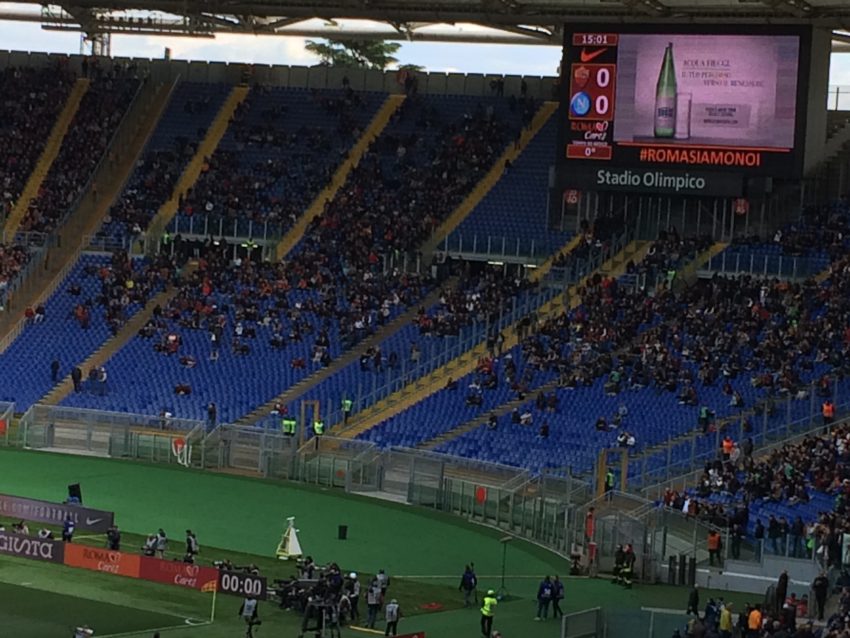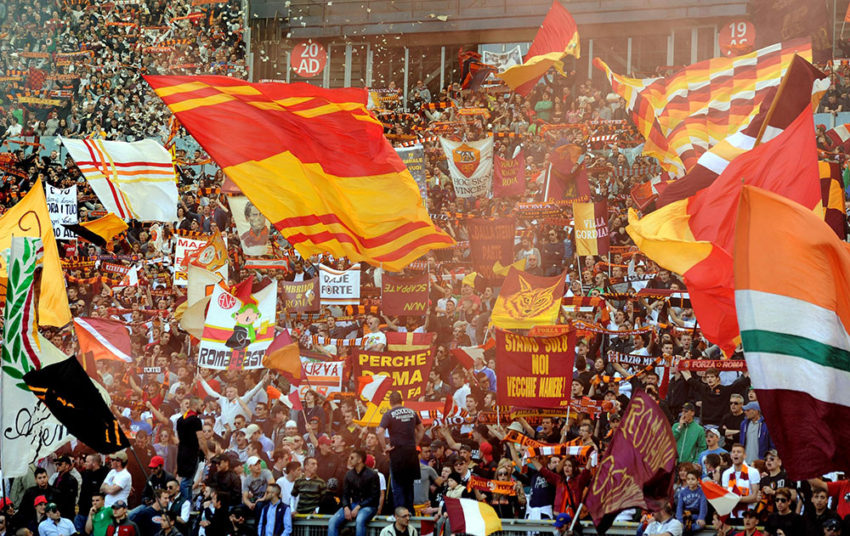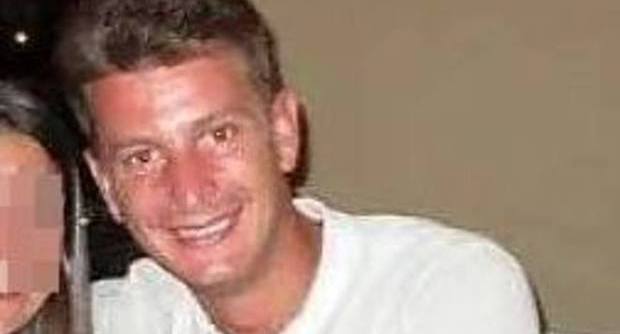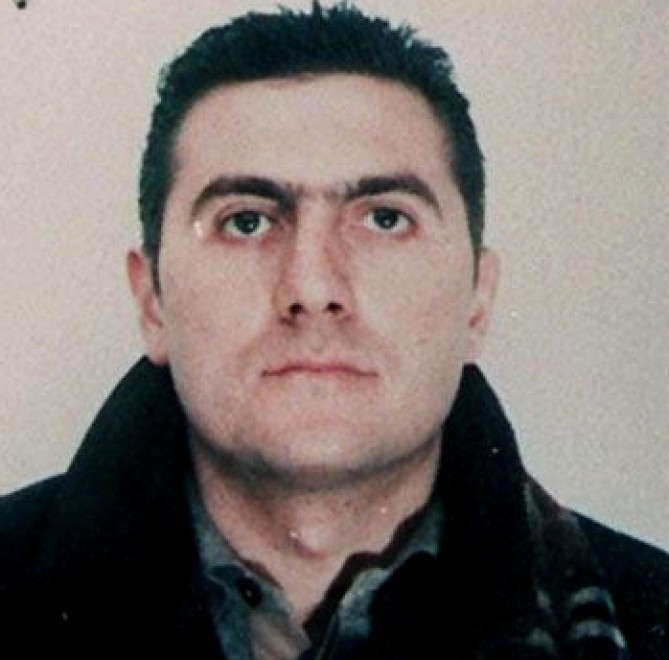A new soccer season beckons and Rome’s fans still disgrace the city

The Olympics are finishing their second week in Rio de Janeiro but here in Rome the real sport started Wednesday night. My beloved A.S. Roma opened its soccer season with a 1-1 tie at Porto. It’s the start of a two-game playoff with the winner going into the lucrative, prestigious Champions League group play, the European club championship that’s even tougher than the World Cup.
The buildup for this season has been something akin to a presidential campaign. Every day the list of A.S. Roma stories in national publications is as long as an Italian restaurant’s shopping list. More potential players have been speculated joining Roma off the market than have worn Roma jerseys the last 10 years. The recent search for a new Rome mayor didn’t carry near the urgency as the search for a new right back.
My love affair with A.S. Roma began 15 years ago when I attended a game in Olympic Stadium’s Curva Nord, a rabid, hard-core section behind the north goal. I bonded with the crowd and ever since, I get choked up listening to “Grazie, Roma” at the end of Roma victories. My red and yellow A.S. Roma keychain is like a free get-out-of-jail card in my Testaccio neighborhood, where A.S. Roma was formed in 1927.
However, in the last two years I have reached a painful conclusion. It’s one I never thought I’d write considering the depth soccer reaches into the Roma fan’s soul and a culture that’s as deep as wine, art and food. But it’s true.
This city has the worst soccer fans in Europe.
For a tip of the fan base’s melting iceberg, consider Roma opens its Serie A, or national league, season Saturday at home against Udinese. Roma is picked as the best bet to stop Juventus’ string of five straight titles. It’s the last season for Francesco Totti, the native son who will spend his 25th season wearing the Roma jersey and is the most popular figure in Rome since Augustus. Yet 72,000-seat Olympic Stadium Saturday will not sell out. They are frantically selling individual seats in Curva Sud, which is usually filled cheek to cheek three hours before kickoff. As of Tuesday they had sold only 17,000 season tickets, a shocking number considering the passion I see in this city rivals that of the Denver Broncos’ in my old stomping grounds.

Roma averaged only 40,190 fans a year ago despite finishing in third place with a 17-game unbeaten run. I attended the fourth to the last game of the season against second-place Napoli which led Roma by only five points. The stadium had nearly 40,000 empty seats. It was so quiet I could hear new savior coach Luciano Spalletti yelling at his players.


But it’s not just attendance where the Rome fan falters. It’s their behavior. Lazio, Roma’s bitter cross-town rival, had four racist incidents in the 2012-13 season alone. Just last March the referee suspended a Europa League game in Prague after visiting Lazio fans made racist chants at Sparta Praga’s Costa Nhamoinesu from Zimbabwe. Three seasons ago a Roma ultra named Daniele De Santis shot and killed Napoli fan Ciro Esposito outside the stadium before the Napoli-Fiorentina Italian Cup final. Then Roma fans desecrated and stole the monument Napoli fans erected for him in Naples. That’s after holding up a banner inside the stadium ridiculing Esposito’s mother for writing a book about her son.
This is like one of the world’s most famous sports franchises in arguably the most elegant, beautiful cities in the world having a fan base of absolute neanderthals. Knowing the Curva Sud ultras, they’ll take that as a compliment. It isn’t. It is an indictment on a fan base that drags the entire city’s reputation down in the gutter where those fans drag their knuckles.

Truth be told, Roma soccer fans almost prevented me from moving to Rome 2 ½ years ago. In the spring of 2013, as I was planning a retirement in Rome I thought I’d only dream about, Roma played at A.C. Milan. Milan had a player named Mario Balotelli. He was born to Ghanian parents in Palermo, Sicily, moved to the Lombardy region of Northern Italy at 2 and at 3 was given up to a middle-class foster family, the Balotellis. They raised him in the small Lombardy town of Concesio. Mario Balotelli is as Italian as Francesco Totti. He just doesn’t look it. On that night in famed San Siro stadium, every time Balotelli touched the ball, Roma’s’ traveling contingent of fans made monkey noises. Think about that. Monkey noises. At a black player. In 2013. Balotelli merely put his index finger to his lips. He was used to it. Imagine Detroit fans making monkey sounds at Cleveland’s Lebron James every time he touched the ball.
I was appalled, shocked and embarrassed that I’d even consider moving to such a racist city. However, after I extinguished the match I had poised over my A.S. Roma gear, I emailed some long-time American expats in Rome who were even more knee-jerk liberal than I am. And I’m just to the left of Gandhi. They told me that racism in Rome is isolated in a small group of soccer fans. They asked me: How many racist incidents did I see the first time I lived in Rome from 2001-03? I thought about it. None. I never met a racist in Rome.

So I moved in January 2014, and here I am. I still haven’t met a racist in Rome, but I’m barbecuing Rome soccer fans again. Their actions belie their words. Their passion can not surpass their ignorant stubbornness. The source of fans’ discontent is a little plexiglass wall. It’s about as imposing as a speed bump. In trying to stop a flood with a sponge, the city of Rome placed a barrier about seven feet high down the middle of Curva Sud and Curva Nord, the stronghold of the Lazio ultras. The city said its aim is to curb violence and overcrowding in the curva sections.
Two parties are wildly guilty here: One, if the city thinks a glass barrier will stop Rome’s rabid soccer fans from misbehaving, it is hopelessly out of touch with fan behavior. How a barrier will prevent fans from throwing bombs and flares is something a civil engineer will have to explain. Never mind that most of the fans’ rioting occurs outside the stadium. Never mind that the barrier is on what was a staircase. Never mind that opposing fans have always sat in their own corner of the stadium, protected by a line of police and empty sections on both sides of them. The barrier is a stupid symbol, a lame attempt at a city trying to close what it thinks is an open wound with a piece of cotton gauze.
Two, the fans have used this symbol as a reason to stay from the games. Early last season the ultras, a band of wild, aggressive, passionately loud fans, organized a protest, saying the harmless, stupid barrier sought to divide them. Somehow they have not understood that neither club owns the stadium and both have tried to work behind the scenes with the city to find a solution. They haven’t. As a result, the atmosphere at Olympic Stadium last season went from Alabama’s football stadium during the Auburn game to a pickup game at a company barbecue. Huge swaths of Curva Sud sat empty. Fans in the expensive seats sat on their hands. Playing at Roma was no longer like Christians coming into the Colosseum. It was just another stop on an American Express bus tour.

It didn’t help that American owner James Pallotta called “less than 10 fans” behind the Esposito banner “fucking idiots” and “assholes.” Pallotta is from Boston. He knows a thing about sports rivalries. He also knows when fans go too far. I’m sorry, fellow Romanisti, but ridiculing a dead fan’s mom qualifies as “going too far.” When sports become a vehicle for harassing the dead’s survivors, you have lost your right to defend your intelligence. Yet in fans’ eyes, Pallotta has gone from good to evil in the utterance of one word.
The fans have not returned. The barrier remains and so have the ultras’ protest. Fan representatives have met with city officials repeatedly without coming to a truce. The club did not sell season tickets in the Curva Sud section in attempt to keep the door open for the ultras. However, season ticket sales have been so dismal that for the first time in anyone’s memory they are selling individual seats in Curva Sud to keep it from looking abandoned. It’s the first time Curva Sud hasn’t sold out in 15 years.
The city’s latest scheme are high-tech cameras that will face scan every person entering the stadium gates. They will record every physical detail from eye color to skin tone. If a fan gets in a fight in the stadium or throws an object, the cameras can match the person in the stadium with the person entering the gate. The fans will not be subjected to any more identification requirement, body checks or questions. They won’t know the cameras are there. The film will be destroyed after no more than seven days unless an infraction occurs. Fans have called this a gross invasion of privacy. They make it sound as if stadium officials are conducting anal searches. They think if they scratch their ass it will be broadcast over the Internet. No, but if you start a fight it might. If you don’t want your privacy invaded, don’t start a fight.

Roma’s season has so much promise. It has the national team goalkeepers for Poland and Brazil, Dutch national midfielder Kevin Strootman is finally healthy and promising marksman Edin Dzeko scored 13 goals in eight friendlies and has always exploded his second season with a club. Roma’s leaky, rebuilt defense survived with a tie playing one man down Wednesday and they have a full season under Spalletti. But Totti should ride off into the Roman sunset like a triumphant Roman soldier walking through the gates of Piazza del Popolo. Instead, he could be playing before family and friends and the thousands of reporters who will report his every twitch.
If soccer is a religion in Italy, Rome has lost much of its faithful. “Grazie. Roma” no longer stirs the heart when it’s sung in Olympic Stadium. Today, in the vast emptiness that once was Curva Sud, it stirs echoes.


April 9, 2018 @ 10:53 pm
Football fans know what it means to hold on to your team. Every match you watch, is something that you play along with them.
The Lazio-Roma derby.
The best part about going to watch this derby is you HAVE to choose sides. You can’t stay neutral and complete the game. The stadium is divided between the fans and supporters of the two rival teams. Whichever side you choose to sit, you belong to that team. The energy of the football matches in Italy is infectious
April 10, 2018 @ 12:03 am
Thanks for the note, Amol. I do agree. When I first lived here, the noise at the Olympic was as loud as Denver’s old Mile High Stadium. Then when the ultras boycotted, it was dead. You could hear the coaches yelling at the players. I may go to Sunday’s derby — as a reporter. I’ll leave my colors at home.